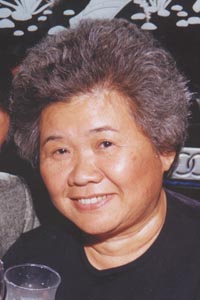 I’m going to break a few rules here. My mother passed away this week. Normally we’re supposed to write about current events that have an Asian theme and how we as Asian Americans react to that news. I don’t think my mom’s passing really makes the news beyond a paid obituary to most people. The second rule I’m going to break is I am going to talk about death and funerals, an absolute no-no in Chinese culture, lest you bring bad luck and early death on yourself.
I’m going to break a few rules here. My mother passed away this week. Normally we’re supposed to write about current events that have an Asian theme and how we as Asian Americans react to that news. I don’t think my mom’s passing really makes the news beyond a paid obituary to most people. The second rule I’m going to break is I am going to talk about death and funerals, an absolute no-no in Chinese culture, lest you bring bad luck and early death on yourself.
Why do I want to write about my mother? Cliche as it might sound, I can think of no greater hero in my life than my mother. That hasn’t always been the case, and I haven’t always seen what a true hero she was. My mom has had to endure more adversity in her life than most people and yet she was one of the strongest people I’ve ever known.
Maybe you don’t know my mother, so let me tell you a little about her. She was the second daughter of eight children, born in Taipei, Taiwan during Japanese occupation in the late 1930’s. Her grandfather was a well known philanthropist in Taiwan, best known for providing graves and burial sites for paupers who could not afford a burial. She was named Meiyin, the Chinese words for “Beautiful” and “Heroic”, a “beautiful hero”. Early on she had a charmed life in Taiwan. The Japanese left Taiwan after they were defeated by the U.S. and my mother got to grow up in relative affluence in Taiwanese society.
For a Chinese woman she was too tall, and prospects for marriage were nearly impossible. So she married my father late in life (for a woman in Taiwan) at the age of 27. By this time the family’s fortunes had dwindled and there was little money left for my mother and father. My father was accepted to graduate school in the United States, and he left his family behind in Taiwan.
A year later the U.S. government invited my mother and her children to join my father in the U.S. under a program designed to convince foreign graduate students to stay in the U.S. My mother borrowed the money for her plane ticket from my aunt and bought two childrens fares for my sister and myself on credit. My mom, used to affluence, had to learn overnight to become a spendthrift in the U.S. We lived on thrift store furniture and hand me down clothing. To save money my mother made all her own clothes, choosing to spend money only on necessities. Even in the harsh New York winter she went without a winter coat.
My mother did an incredible job raising three children with limited resources. She took on piece-work jobs from Chinatown. She worked hard and never complained. It wasn’t in her nature. She never let on to anyone in Taiwan how hard her life in the U.S. was, and made a point of keeping a good face for everyone else’s benefit.
There’s more sorrow and heartache I could write about that my mother had to endure those years, but I’ll refrain as this posting is already too long, and just say she sacrificed a great deal for her family. What she was rewarded with, was three children, all of whom succeeded with college and graduate degrees, good careers and children of their own. I can only hope that she found those sacrifices she made in her life worth it for what she received in return.
She’s the true hero, who kept her family together, the one who made sure everyone was taken care of except herself. Even in later life, when she had three children to depend on, she continued to be self-sacrificing, never indulging in anything for herself. She was diagnosed with breast cancer in 1997. She battled and won for a short time, but in 2005, the breast cancer came back from remission and she had a second long hard battle. Even when she was in pain, she was never willing to admit it.
All throughout her battle she remained true to her Chinese roots. She refused to discuss burial or funeral arrangements, instead stipulating that I, as the only son, handle everything when the time came. She fought for so long and for so hard, it’s difficult to realize that time is now.
All week I’ve been trying to remember all the customs that accompany a Chinese funeral. There’s so many things to remember; the burial blanket, the Buddhist chanting, white envelopes, red envelopes, etc. And there’s so many different traditions depending on where you’re from, that contradict each other. What I’ve found myself doing is taking the customs that make sense for my mom and adding them to Western customs. We’re going to have a Buddhist portion and a Western eulogy. I’m not adhering to all the Chinese customs, but I’m making my best effort to preserve some traditions for my family. You can read more about the actual funeral and traditions around dying in my personal blog.
But in the end, I keep thinking mourning has come too early, and I wish my mom was still here.








